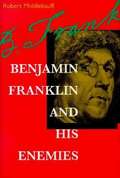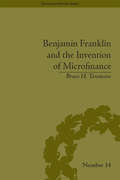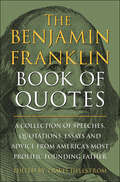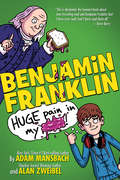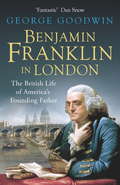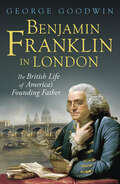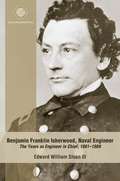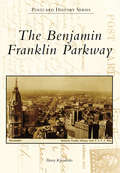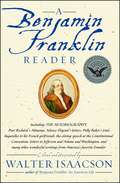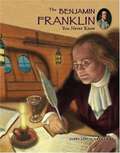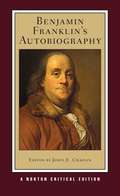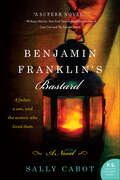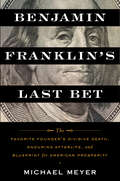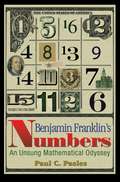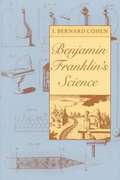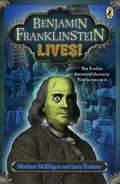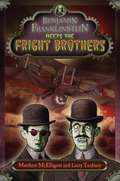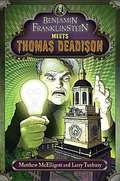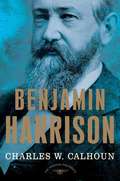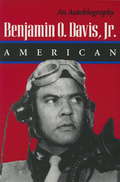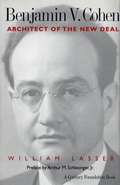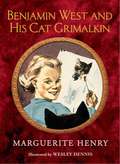- Table View
- List View
Benjamin Franklin and His Enemies
by Robert MiddlekauffMiddlekauff (history, UC-Berkeley) explores Franklin's darker side, his passionate anger and his adversarial relationships with the Penns, John Adams, and Arthur Lee, and his disappointment in his son's loyalty to Britain, weaving episodes in Franklin's life into colonial and Revolutionary history. Annotation c. by Book News, Inc., Portland, OR.
Benjamin Franklin and Polly Baker (Published by the Omohundro Institute of Early American History and Culture and the University of North Carolina Press)
by Max HallHall has made the first detailed investigation of Polly Baker. It leads through the exciting world of eighteenth-century journalism, literature, and statecraft. Ben Franklin occupies a position in the story second only to Polly Baker herself. Evident throughout is the tendency of people, even in an age of enlightenment, to believe what they see--provided they see it in print.Originally published in 1960.A UNC Press Enduring Edition -- UNC Press Enduring Editions use the latest in digital technology to make available again books from our distinguished backlist that were previously out of print. These editions are published unaltered from the original, and are presented in affordable paperback formats, bringing readers both historical and cultural value.
Benjamin Franklin and the Invention of Microfinance (Financial History #14)
by Bruce H. YenawineIn life, Benjamin Franklin sought to manage debt, organize credit, build capital and promote virtue. After death, he continued this work by leaving a codicil to his last will and testament, bequeathing £2,000 to Boston and Philadelphia. This study examines Franklin’s codicil and the financial history of America over the 200 years since his death.
The Benjamin Franklin Book of Quotes: A Collection of Speeches, Quotations, Essays and Advice from America's Most Prolific Founding Father
by Travis HellstromA collection of the best quotes, speeches, and advice from one of the most influential founders of the United States of America.Benjamin Franklin is a towering figure not just in American history, but history in general. A true Renaissance man adept in politics, science, writing and more, his words have been a source of wisdom and inspiration for a long time. The Benjamin Franklin Book of Quotes compiles his best quotes, speeches, and advice in one place and reaches out to an America, and a world, which need them more than ever. Organized into sections by themes, this book is accessible and easy to share with friends and loved ones. The themes featured are:VirtueCharacterLearningAuthenticityHard WorkHappinessWisdomKindnessLeadershipHumorSimplicityLoveSpirituality
Benjamin Franklin: Huge Pain in my... (Benjamin Franklin #1)
by Adam Mansbach Alan ZweibelDear Mr. Franklin, First of all, let me just say that this Assignment is Stupid. You are Dead. Why am I writing a letter to Some dead guy I've never even met? This is the start to a most unlikely pen pal relationship between thirteen-year-old Franklin Isaac Saturday (Ike) and Benjamin Franklin. Before the fateful extra credit assignment that started it all, Ike's life was pretty normal. He was avoiding the popularity contests of middle school, crushing hard on Clare Wanzandae and trying not roll his eyes at his stepfather, Dirk-the-Jerk's lame jokes. But all that changes when, in a successful effort to make Claire Wanzandae laugh, Ike mails his homework assignment to Ben Franklin???and he writes back. Soon, things go awry. After Ike has an embarrassing moment of epic proportions in front of Claire involving a playground, non-alcoholic beer, and a lot of kettle corn, Ike decides he needs to find a way to win Claire back. With some help from his new friend, B-Fizzle, can Ike get the girl and make his mark in history?
Benjamin Franklin in London: The British Life of America's Founding Father
by George Goodwin'Sensitive, moving and finely textured' Guardian'Fantastic' Dan SnowFor the great majority of his long life, Benjamin Franklin was a loyal British royalist. In 1757, having made his fortune in Philadelphia and established his fame as a renowned experimental scientist, he crossed the Atlantic to live as a gentleman in the heaving metropolis of London. With just a brief interlude, a house in Craven Street was to be his home until 1775. From there he mixed with both the brilliant and the powerful, whether in London coffee house clubs, at the Royal Society, or on his summer travels around the British Isles and continental Europe. He counted David Hume, Matthew Boulton, Joseph Priestley, Edmund Burke and Erasmus Darwin among his friends, and as an American colonial representative he had access to successive Prime Ministers and even the King.The early 1760s saw Britain's elevation to global superpower status with victory in the Seven Years War and the succession of the young, active George III. These two events brought a sharp new edge to political competition in London and redefined the relationship between Britain and its colonies. Though Franklin long sought to prevent the break with Great Britain, his own actions would finally help cause that very event. On the eve of the American War of Independence, Franklin fled arrest and escaped by sea. He would never return to London. With his unique focus on the fullness of Benjamin Franklin's life in London, George Goodwin has created an enthralling portrait of the man, the city and the age.
Benjamin Franklin in London: The British Life of America's Founding Father (The Lewis Walpole Series in Eighteenth-Century Culture and History)
by George GoodwinAn “enthralling” chronicle of the nearly two decades the statesman, scientist, inventor, and Founding Father spent in the British imperial capital (BBC Radio 4, Book of the Week).For more than a fifth of his life, Benjamin Franklin lived in London. He dined with prime ministers, members of parliament, even kings, as well as with Britain’s most esteemed intellectuals—including David Hume, Joseph Priestley, and Erasmus Darwin—and with more notorious individuals, such as Francis Dashwood and James Boswell. Having spent eighteen formative months in England as a young man, Franklin returned in 1757 as a colonial representative during the Seven Years’ War, and left abruptly just prior to the outbreak of America’s War of Independence, barely escaping his impending arrest.In this fascinating history, George Goodwin gives a colorful account of Franklin’s British years. The author offers a rich and revealing portrait of one of the most remarkable figures in U.S. history, effectively disputing the commonly held perception of Franklin as an outsider in British politics. It is an absorbing study of an American patriot who was a fiercely loyal British citizen for most of his life—until forces he had sought and failed to control finally made him a reluctant revolutionary at the age of sixty-nine.“[An] interesting, lively account of Franklin’s British life.” —The Wall Street Journal
Benjamin Franklin Isherwood, Naval Engineer
by Edward William Sloan IIIA classic account of the 40-year Naval career of Benjamin Franklin Isherwood, whose contributions to Naval engineering helped usher in the development of the modern American Navy. Focusing on the years during and immediately after the Civil War, this study chronicles the extensive contributions made by Isherwood in expanding the size and scope of the U.S. Navy.
Benjamin Franklin Parkway, The
by Harry KyriakodisThe Benjamin Franklin Parkway has sliced through the Logan Square neighborhood of Center City (downtown) Philadelphia since World War I. Named after Philadelphia's favorite son, the mile-long boulevard begins at city hall and heads diagonally towards Logan Circle before reaching the Philadelphia Museum of Art. The postcards and other images in this work show the parkway's development and its role in Philadelphia's civic and cultural life. Despite often serving as a speedway into and out of town, the Ben Franklin Parkway is a triumph in urban planning that has become a treasured part of the City of Brotherly Love.
Benjamin Franklin, Pennsylvania, and the First Nations: The Treaties of 1736-62
by Susan KalterBritish colonial relations with the native peoples of eastern North America This is an annotated edition of the treaties between the British colonies and Indian nations, originally printed and sold by Benjamin Franklin. Last published in 1938, Benjamin Franklin, Pennsylvania, and the First Nations makes these important treaties available once again, featuring a simpler, easier-to-read format, extensive explanatory notes, and maps. A detailed introduction by Susan Kalter puts the treaties in their proper historical and cultural context. This carefully researched edition shows these treaties to be complex intercultural documents, and provides significant insight into the British colonists' relationship with native peoples of North America. They also reveal the complexity of Benjamin Franklin's perceptions of Native Americans, showing him in some negotiations as a promoter of the Indian word against the colonial one. Finally, the treaties offer an enormous wealth of linguistic, aesthetic, and cultural information about the Iroquois, the Delawares, and their allies and neighbors.
A Benjamin Franklin Reader
by Walter IsaacsonSelected and annotated by the author of the acclaimed Benjamin Franklin: An American Life, this collection of Franklin's writings shows why he was the bestselling author of his day and remains America's favorite Founder and wit. As a twelve-year-old apprentice in his brother's print shop, Benjamin Franklin taught himself to be a writer by taking notes on the works of great essayists such as Addison and Steele, jumbling them up, and then trying to recreate them in his own words. By that method, he recalled in his Autobiography, he was encouraged to think he might become a "tolerable" writer. In fact, he became the best, most popular, and most influential writer in colonial America. His direct and practical prose shaped America's democratic character, and his homespun humor gave birth to the nation's unique brand of crackerbarrel wisdom. This book collects dozens of Franklin's delight-ful essays and letters, along with a complete version of his Autobiography. It includes an introductory essay exploring Franklin's life and impact as a writer, and each piece is accompanied by a preface and notes that provide background, context, and analysis. Through the writings and the introductory essays, the reader can trace the development of Franklin's thinking, along with the birth of the nation he and his pen helped to invent.
The Benjamin Franklin You Never Knew
by James Lincoln CollierTraces the life of Benjamin Franklin, clarifying the legend of flying a kite when lightning was in the sky, and presents his scientific, diplomatic and political successes and failures.
Benjamin Franklin's Autobiography
by Joyce E. Chaplin Benjamin FranklinChaplin (early American history, Harvard U. ) presents an edition of Benjamin Franklin's Autobiography that includes an introduction that explains the history of the autobiography within the larger history of the genre and the history of celebrity, new and expanded explanatory annotations, three maps, a guide to people mentioned in the text, and illustrations. It also presents the recently identified "Wagon Letters"; a "contexts" section that includes his journal entries from a 1726 voyage, pieces of correspondence, excerpts from writings on ambition, fame, and wealth, his views on self-improvement, and his last will; and a criticism section containing both contemporary, nineteenth-century, and recent opinions on Franklin, from Immanuel Kant to Edgar Allan Poe to D. H. Lawrence. Annotation ©2012 Book News, Inc , Portland, OR (booknews.com)
Benjamin Franklin's Bastard: A Novel
by Sally CabotBenjamin Frankiln’s Bastard by Sally Cabot is an absorbing and compelling work of literary historical fiction that brings to life a little-known chapter of the American Revolution — the story of Benjamin Franklin and his bastard son, and the women who loved them both.William Franklin, the son of Benjamin and his favorite mistress, Anne, is raised by Deborah, Benjamin’s wife. A steadfast loyalist, he and his father cannot reconcile their wildly disparate views, causing a rift in the bond both thought unbreakable.Fascinating and heartbreaking, Benjamin Franklin’s Bastard is a gripping tale of family, love, and war, set against one of America’s most fascinating periods of history.
Benjamin Franklin's Last Bet: The Favorite Founder's Divisive Death, Enduring Afterlife, and Blueprint for American Prosperity
by Michael MeyerThe incredible story of Benjamin Franklin’s parting gift to the working-class people of Boston and Philadelphia—a deathbed wager that captures the Founder’s American Dream and his lessons for our current, conflicted age. Benjamin Franklin was not a gambling man. But at the end of his illustrious life, the Founder allowed himself a final wager on the survival of the United States: a gift of two thousand pounds to Boston and Philadelphia, to be lent out to tradesmen over the next two centuries to jump-start their careers. Each loan would be repaid with interest over ten years. If all went according to Franklin’s inventive scheme, the accrued final payout in 1991 would be a windfall. In Benjamin Franklin’s Last Bet, Michael Meyer traces the evolution of these twin funds as they age alongside America itself, bankrolling woodworkers and silversmiths, trade schools and space races. Over time, Franklin’s wager was misused, neglected, and contested—but never wholly extinguished. With charm and inquisitive flair, Meyer shows how Franklin’s stake in the “leather-apron” class remains in play to this day, and offers an inspiring blueprint for prosperity in our modern era of growing wealth disparity and social divisions.
Benjamin Franklin's Letters to the Press, 1758-1775 (Published by the Omohundro Institute of Early American History and Culture and the University of North Carolina Press)
by Verner W. CraneThis collection of Franklin's political writings contains more than double the number previously recognized as his. Much of this writing was performed during the intensive press campaigns for repeal by parliament of obnoxious measures, such as the Stamp Act and Townshend Acts. His letters reveal the adjustment he was making in his private ideas of British empire and American rights.Originally published in 1950.A UNC Press Enduring Edition -- UNC Press Enduring Editions use the latest in digital technology to make available again books from our distinguished backlist that were previously out of print. These editions are published unaltered from the original, and are presented in affordable paperback formats, bringing readers both historical and cultural value.
Benjamin Franklin's Numbers: An Unsung Mathematical Odyssey
by Paul C. PaslesFew American lives have been as celebrated--or as closely scrutinized--as that of Benjamin Franklin. Yet until now Franklin's biographers have downplayed his interest in mathematics, at best portraying it as the idle musings of a brilliant and ever-restless mind. In Benjamin Franklin's Numbers, Paul Pasles reveals a side of the iconic statesman, scientist, and writer that few Americans know--his mathematical side. In fact, Franklin indulged in many areas of mathematics, including number theory, geometry, statistics, and economics. In this generously illustrated book, Pasles gives us the first mathematical biography of Benjamin Franklin. He draws upon previously unknown sources to illustrate Franklin's genius for numbers as never before. Magic squares and circles were a lifelong fascination of Franklin's. Here, for the first time, Pasles gathers every one of these marvelous creations together in one place. He explains the mathematics behind them and Franklin's hugely popular Poor Richard's Almanac, which featured such things as population estimates and a host of mathematical digressions. Pasles even includes optional math problems that challenge readers to match wits with the bespectacled Founding Father himself. Written for a general audience, this book assumes no technical skills beyond basic arithmetic. Benjamin Franklin's Numbers is a delightful blend of biography, history, and popular mathematics. If you think you already know Franklin's story, this entertaining and richly detailed book will make you think again.
Benjamin Franklin's Science
by I. Bernard CohenBenjamin Franklin is well known to most of us, yet his fundamental and wide-ranging contributions to science are still not adequately understood. Until now he has usually been incorrectly regarded as a practical inventor and tinkerer rather than a scientific thinker. He was elected to membership in the elite Royal Society because his experiments and original theory of electricity had made a science of that new subject. His popular fame came from his two lightning experimentsâe"the sentry-box experiment and the later and more famous experiment of the kiteâe"which confirmed his theoretical speculations about the identity of electricity and provided a basis for the practical invention of the lightning rod. Franklin advanced the eighteenth-century understanding of all phenomena of electricity and provided a model for experimental science in general. I. Bernard Cohen, an eminent historian of science and the principal elucidator of Franklinâe(tm)s scientific work, examines his activities in fields ranging from heat to astronomy. He provides masterful accounts of the theoretical background of Franklinâe(tm)s science (especially his study of Newton), the experiments he performed, and their influence throughout Europe as well as the United States. Cohen emphasizes that Franklinâe(tm)s political and diplomatic career cannot be understood apart from his scientific activities, which established his reputation and brought him into contact with leaders of British and European society. A supplement by Samuel J. Edgerton considers Franklinâe(tm)s attempts to improve the design of heating stoves, another practical application that arose from theoretical interests. This volume will be valuable to all readers wanting to learn more about Franklin and to gain a deeper appreciation of the development of science in America.
Benjamin Franklinstein Lives!
by Mcelligott Matthew Tuxbury LarryVictor Godwin's orderly life is upended when he discovers that Benjamin Franklin never actually died- he was put into suspended animation and hidden away for more than 200 years in Victor's basement! After an accident reawakens Ben, Victor must not only help him adjust to the modern world but also help him overcome a slight flaw-when Ben runs low on energy, he turns into a rampaging monster desperately hungry for electricity! All this while trying to take first place in the school science fair. With one of history's preeminent scientists helping out, what could go wrong? .
Benjamin Franklinstein Meets the Fright Brothers
by Mcelligott Matthew Tuxbury LarryBefore Victor and Benjamin Franklin can figure out why he awoke from his 200-plus years of sleep, giant bat planes and mysterious attacks bring mayhem to Philadelphia. Only two of history's inventors could pilot such high-flying creations-the famous Wright brothers! But the red-eyed brothers don't seem quite like themselves. . . . Victor and Ben discover that the giant bat planes are part of a nefarious plan to gain mind-control over everyone in the city. Could the brothers really want to take over Philadelphia-and can Victor and his friends crash their plans in time? Uncover the secrets of Benjamin Franklinstein, and more of history's greatest inventors, at www. benjaminfranklinstein. com.
Benjamin Franklinstein Meets Thomas Deadison
by Matthew Mcelligott Larry TuxburyBenjamin Franklinstein's most electrifying adventure yetVictor Godwin and his very old friend, 200-year-old reanimated Benjamin Franklin, are back for more madcap fun! After releasing the Wright Brothers from the clutches of the nefarious Emperor, the pair are working with the dwindling members of the Promethean Underground to try to stop the Emperor altogether. But when new Infinity light bulbs are installed throughout Philadelphia, Ben and Victor realize they are emitting more than just light. It turns out that Thomas Edison's scientific genius has been hijacked as well, allowing the Emperor to brainwash just about everyone to do his evil bidding. Zombies, mystery, and mayhem keep the pages turning in this hilariously quirky adventure, and the illustrations, puzzles and a fantastic interactive website extend the fun. .
Benjamin Harrison (The American Presidents Series)
by Charles W. CalhounPolitics was in Benjamin Harrison's blood. His great-grandfather signed the Declaration and his grandfather, William Henry Harrison, was the ninth president of the United States. Harrison, a leading Indiana lawyer, became a Republican Party champion.
Benjamin O. Davis, Jr.: American
by Benjamin O. DavisSet against the backdrop of twentieth-century America, against the social fabric of segregation and the broad canvas of foreign war, Benjamin O. Davis, Jr.: American tells a compelling story of personal achievement against formidable odds. Born into an era when potential was measured according to race, Davis was determined to be judged by his character and deeds--to succeed as an American, and not to fail because of color. With twelve million citizens --the black population of the United States--pulling for him, Davis entered West Point in 1932, resolved to become an officer even though official military directives stated that blacks were decidedly inferior, lacking in courage, superstitious, and dominated by moral and character weaknesses. "Silenced" by his peers, for four years spoken to only in the line of duty, David did not falter. He graduated 35th in a class of 276 and requested assignment to the Army Air Corps, then closed to blacks. He went on to lead the 99th Pursuit Squadron and the 332nd Fighter Group--units known today as the Tuskegee Airmen--into air combat over North Africa and Italy during World War II. His performance, and that of his men, enabled the Air Force to integrate years before civilian society confronted segregation. Thereafter, in a distinguished career in the Far East, Europe, and the United States, Davis commanded both black and white units. Davis's story is interwoven with often painful accounts of the discrimination he and his wife, Agatha, endured as a fact of American military and civilian life. Traveling across the country, unable to find food and lodging, they were often forced to make their way nonstop. Once on base, they were denied use of clubs and, in the early days, were never allowed to attend social activities. Though on-base problems were solved by President Truman's integration of the military in 1949, conditions in the civilian community continued, eased but not erased by enactment of President Johnson's legislative program in the 1960s. Overseas, however, where relations were unfettered by racism, the Davises enjoyed numerous friendships within the military and with such foreign dignitaries as President and Madame Chiang Kai-shek. Benjamin O. Davis, Jr., retired in 1970 as a three-star general. His autobiography, capturing the fortitude and spirit with which he and his wife met the pettiness of segregation, bears out Davis's conviction that discrimination--both within the military and in American society--reflects neither this nation's ideals nor the best use of its human resources.
Benjamin V. Cohen: Architect of the New Deal
by William LasserThis is a biography of Benjamin V. Cohen focusing on the "New Deal" giant.
Benjamin West and His Cat Grimalkin
by Marguerite HenryThis is the story of a Quaker lad and his cat who lived in America when Pennsylvania was still an English province, and the Indians were saying, "Itah! Good be to you!" Benjamin's father kept Door-Latch Inn in the County of Chester. Benjamin had four brothers-John, Thomas, Samuel and Joseph-and five sisters named Rachel, Sarah, Hannah, Mary and Elizabeth. He had a niece named Sally, too. Benjamin's family were all Quakers. Papa was the best Quaker of them all. When he prayed, his voice trembled and quaked until the very roof timbers shook! Benjamin's fingers often itched to draw "images" of people or animals or landscapes. But Mama and Papa didn't approve. They thought pictures were needless. They said images should be carried in the heart, that pictures were gay and gaudy and showed a worldly spirit. Of course they had no pictures in Door- Latch Inn. Benjamin never saw one until he grew up to be seven years old and painted one himself. Grimalkin, the glossy black cat, suggested-for he could almost talk-that Benjamin make an image of little Sally, and after that he drew so many that everybody knew he could be nothing but an artist. Some people say it was the Mohawk Indians who helped Benjamin win fame and fortune as an artist. Some say it was an artist and seaman by the name of William Williams. And some insist that it was Uncle Phineas, a merchant of Philadelphia. But if Benjamin West himself could have settled the question, he would probably say it was his cat Grimalkin.
